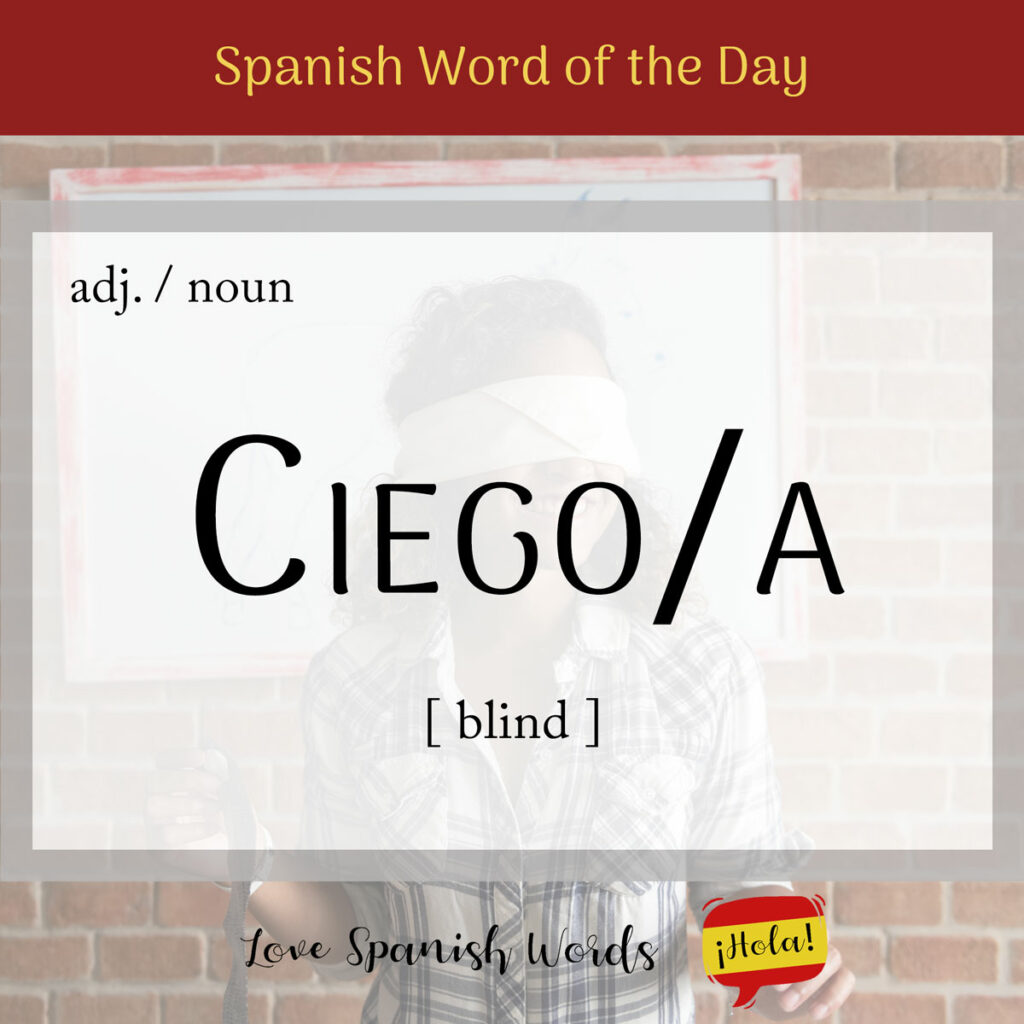The word ciego, meaning blind in English, originates from the Latin word caecus, which also means blind. Over time, caecus evolved into ciego in Spanish, describing the lack of sight or the inability to see.
Latin American Pronunciation
European Pronunciation

Ciego is a masculine adjective that describes a masculine noun and ciega is the feminine version describing a feminine noun.
Ciego and ciega are also used as nouns when referring directly to a person who is blind. Below are the definite and indefinite articles.
- el ciego/a = the blind person
- los ciegos/as = the blind people
- un ciego/una ciega = a blind person
- unos ciegos/unas ciegas = some blind people
El muchacho quedó ciego después del accidente de carro.
The boy was left blind after the car accident.
Its literal use as an adjective describes a person who cannot see. It can also be used to describe an animal that can’t see.
- El niño nació ciego. = The child was born blind.
- La mujer ciega tiene un perro guía para moverse por la ciudad. = The blind woman has a guide dog to move around the city.
El ciego lee en braille.
The blind man reads in braille.
The word is also used figuratively or metaphorically to express a lack of insight, understanding, or awareness. It is used when someone is unable to perceive something, such as a problem or the truth of an important matter.
- Está ciego a la verdad y no quiere aceptar su error. = He is blind to the truth and does not want to accept his mistake.
- El amor la hizo ciega a la infidelidad de su pareja. = Love made her blind to her husband’s infidelity.

The phrase ciegos y sordos translates to blind and deaf and is used in Spanish to describe someone who chooses to ignore information and is unwilling to acknowledge the truth. It also implies a refusal to listen or perceive what is critical or evident.
This phrase is often used in a social or political context where an individual or group chooses to be blind and deaf to the issues around them.
Muchas personas son ciegas a las injusticias que ocurren en el mundo.
Many people are blind to the injustices occurring in the world.

One popular song by Colombian artist Shakira called Ciega, Sordomuda (blind, deaf, and mute) is about being so blindly in love that she doesn’t see the man’s red flags.
In many Spanish-speaking countries, the name of the song is a popular phrase to use about those who are blindly in love.
Below are some derivatives using the word ciego/a:
- ceguera = blindness (noun)
- ciego/a de nacimiento = blind from birth
- a ciegas = blindly
- calle ciega = dead end street
- necesidad ciega = blind necessity
- daltonico/a = colour blind
Entró al trabajo a ciegas sin investigar primero el puesto.
He entered the job blindly without first researching the position.

Spanish idioms featuring ‘ciego/a‘
Estar ciego de amor
Literal translation: to be blind with love
English meaning: to be unable to see the flaws of those you love when you are deeply in love
Estar ciego de ira
Literal translation: to be blind with rage
English meaning: to have intense anger that’s hard to control making it difficult to reason
Estar ciego a algo
Literal translation: to be blind to something
English meaning: to be unaware of or to ignore something obvious to others, or something that one should be aware of
Hacer algo a ciegas
Literal translation: to do something blindly
English meaning: to do something without thinking about it or without having enough information

